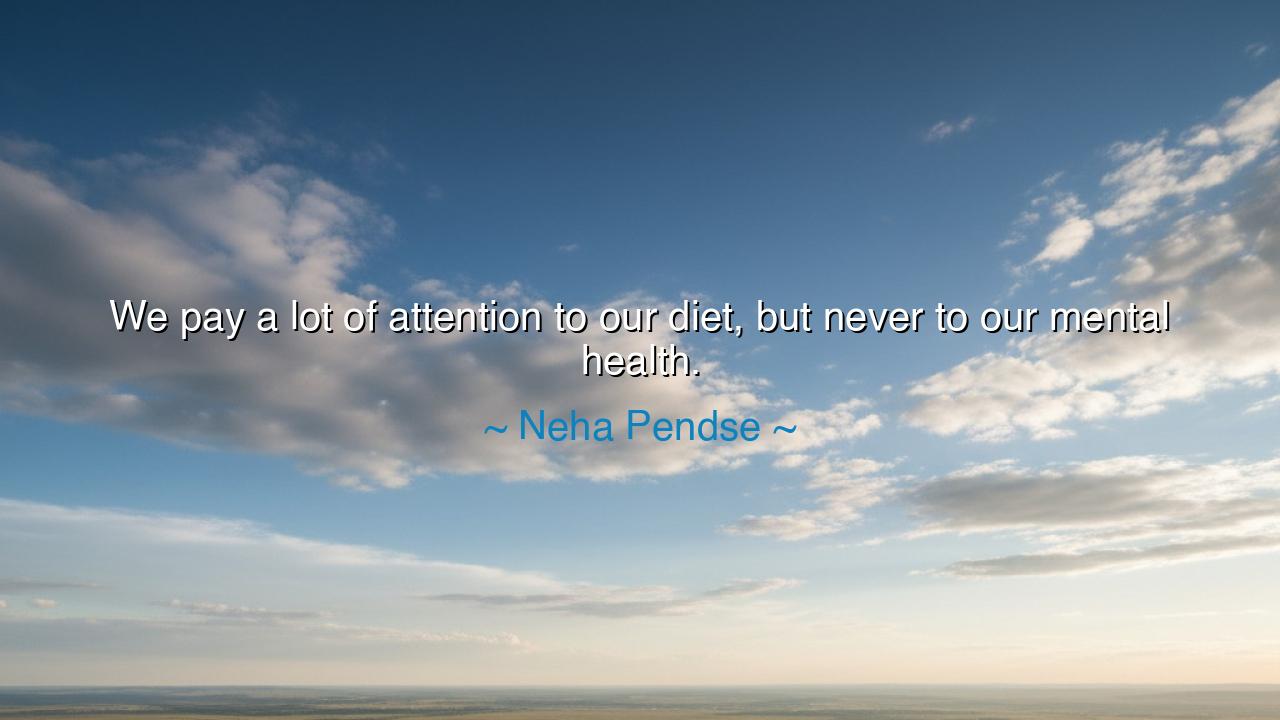
We pay a lot of attention to our diet, but never to our mental






"We pay a lot of attention to our diet, but never to our mental health." These words, spoken by Neha Pendse, echo a timeless truth about the nature of human existence—our bodies and minds are intricately intertwined, and yet, we often neglect one while nurturing the other. In a world that prizes physical health and the appearance of strength, the mental realm is often cast aside, left in the shadows, as if it does not require the same level of care and attention. We devote ourselves to nourishing our bodies, to ensuring we are well-fed, well-exercised, and well-rested, but the state of our minds—that unseen force that guides our thoughts, emotions, and actions—often goes unnoticed. Pendse’s words are a clarion call to balance: just as we seek to care for our bodies, we must also turn inward to tend to the health of our minds.
In ancient times, the great philosophers understood the connection between mind and body long before modern science confirmed their intertwined nature. Socrates, the wise philosopher of Greece, believed that the path to wisdom required not only the cultivation of knowledge but the balance of the mind. He taught his disciples that to live a virtuous life, one must care for the soul, for it is the soul that governs all actions and decisions. Just as a warrior would sharpen his sword before battle, so too must a person sharpen their mind, keeping it free from distraction and turmoil. The ancient Greeks knew that the health of the body was just one part of a greater whole, and that the mind, when clouded or unbalanced, would undermine all other pursuits.
Consider the story of Alexander the Great, whose military genius and ambition knew no bounds. He conquered vast empires and led armies to victory, yet his mental health was often in turmoil. His ambition, once fueled by wisdom and clarity, began to spiral into paranoia and self-doubt. As his empire expanded, so too did his inner conflicts, and it is said that towards the end of his life, the once-great conqueror struggled with bouts of depression and melancholy. His physical prowess was unmatched, but without a balanced and healthy mind, even his empire faltered. His story serves as a reminder that mental health—like physical health—requires constant attention and care, lest it falter in the face of life’s demands.
Pendse’s words also reflect a modern truth: we often focus on outward health, the appearance of strength and vitality, but neglect the inner work that ensures true well-being. The body is a vessel, but the mind is the captain, steering the ship through the storms of life. Just as a warrior must maintain both his sword and his shield, so must we tend to both our physical and mental health. In our modern world, there is an abundance of advice on how to eat well, exercise regularly, and care for the body. Yet, how often do we hear the same urgency applied to mental health? How often do we seek guidance on nurturing the mind, on keeping our thoughts clear, our emotions balanced, and our spirits strong?
In the Bhagavad Gita, the ancient text of wisdom, Lord Krishna speaks of the importance of a balanced mind. He tells the warrior Arjuna that only with a clear, steadfast mind can one overcome the challenges of life. The mind, Krishna teaches, is both the source of peace and suffering. When the mind is troubled, the body cannot function at its highest potential. But when the mind is at peace, when it is cared for and nurtured, it brings clarity and strength to all endeavors. This timeless wisdom is as true today as it was in ancient India: a healthy mind is not a luxury—it is the foundation of a thriving life.
The lesson we learn from Neha Pendse’s words is both profound and urgent. We must not neglect the state of our minds, for just as a malnourished body cannot achieve its full potential, neither can a troubled mind. The mind is the seat of our decisions, our actions, and our relationships. If we are to live with purpose, with clarity, and with strength, we must cultivate mental health with the same dedication we give to our physical health. This means making time for rest, reflection, and mindfulness. It means addressing the mental burdens we carry, whether through conversation, therapy, or simply through moments of quiet self-awareness.
Let us take action in our own lives. Just as we nourish our bodies with good food, let us nourish our minds with healthy thoughts. Let us recognize the importance of our mental well-being and seek the balance that Socrates, Krishna, and countless other wise teachers have spoken of. In our pursuit of success, let us not forget that the greatest victory is not in outward strength, but in the strength of the mind, in the clarity of thought, and in the resilience of the spirit. Only by caring for both our bodies and minds can we live whole, balanced, and fulfilled lives.






AAdministratorAdministrator
Welcome, honored guests. Please leave a comment, we will respond soon